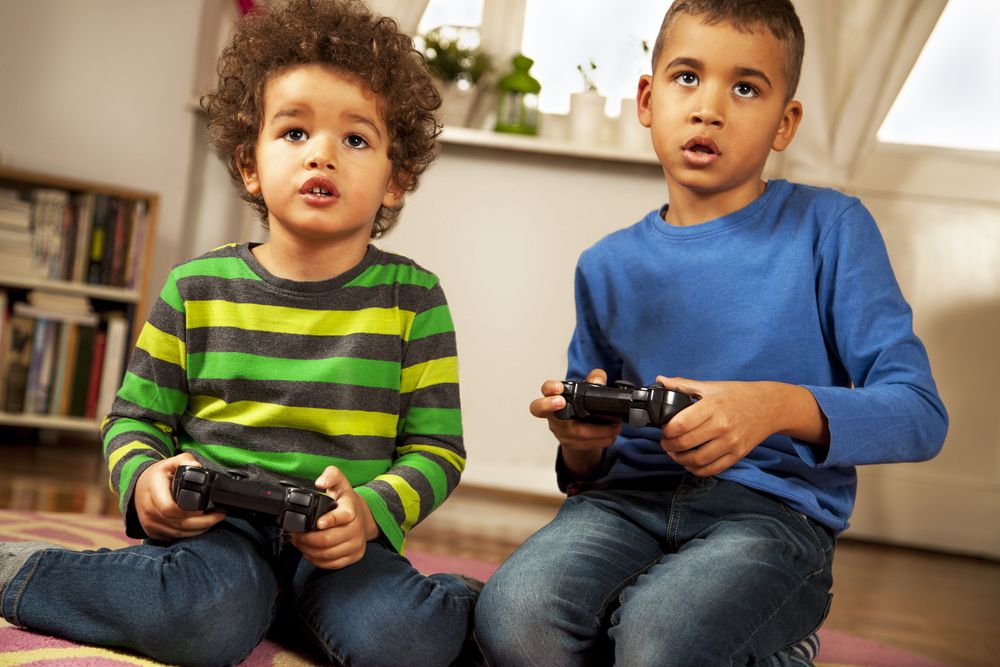
Over the past few decades, research about the effect of video games on children has been largely negative. Since the early 1990s, video games have been found to be addictive, are believed to cause violent behaviors and thoughts, and possibly stunt brain development.
The American Academy of Child and Adolescent Psychiatry (AACAP) recommends that children between ages 2 to 5 should only have up to an hour a day of screen time, such as watching TV or playing games, and up to 3 hours on weekends. For children ages 6 and older, they encourage limiting screen time and turning off all screens up to an hour before bedtime.
Generally, it’s agreed upon that limiting screen time for children is healthy and can lead to better sleep and self-regulation. But what about video games?
More recent studies have found video games to have a positive impact on children’s brain development, while other research has found video games to have harmful effects on a child’s abilities to self-regulate and control aggressive behaviors.
With so many different voices on this topic, let’s take a moment to look at what the research actually says about video games. Are they truly as harmful to your children as we have believed?
Positive Effects of Video Games on Children
Though research has generally concluded video games have an adverse effect on children, a new study has found strong cognitive benefits. This 2022 study examined 2217 children between 9 and 10 years old. The researchers conducted two different analyses and found that children who played video games for at least 21 hours per week showed better memory and response times. The researchers also found that video games positively affected their visual, attention, and memory processing.
An older study also found that video games may help children react quicker and improve brain function. Another study from 2020 suggested commercial video games can enhance the ability to change tasks quickly and filter through information. And yet another study from 2017 suggests children who play video games learn how to solve problems better. Though all of these studies have limitations, just like all research does, it builds the argument that video games may benefit a child’s cognition and mental processing.
Adverse Effects of Video Games on Children
Though video games seem to benefit children cognitively, behaviorists and mental health specialists may state otherwise. The World Health Organization (WHO) even classified gaming disorder as a mental health condition in the International Classification of Diseases (ICD) in 2018.
Many studies have found that video games lead to behavioral and mental health issues such as a lack of self-control, physical aggression, and depression. Several studies like this one from 2018 and an older one from 2001 have discovered that violent video games lead to greater physical aggression over time in children. One 2017 study also found children who played graphically violent video games displayed less empathy. According to an article in the International Journal of School and Cognitive Psychology, children playing excessive video games were more likely to exhibit depression symptoms.
The general consensus is that graphically violent video games may be the cause of more aggressive thoughts and behaviors in children.
Conclusion: What Can Parents Do?
Overall, the research provides substantial evidence for both the positive and negative effects of video games on children.
Depending on the type of video games played, children playing more cooperative games may experience an increase in:
- Problem-solving skills
- Self-regulation
- Hand-eye coordination
- Ability to change tasks quickly
- Memory
The best course of action as a parent is to limit your child’s screen time and allow them to play video games that are educational and stimulate the brain with puzzles and other non-violent activities.
However, video games can also have an adverse effect if your child begins to avoid daily activities they used to enjoy or have difficulty getting off the screen. If you notice your child becoming more irritable when they aren’t playing video games, turning to physical aggression or emotional outbursts when asked to turn off the game, avoiding other activities such as playing with friends or toys, going to school, or participating in extracurricular activities, or struggling to connect and build friendships with others, you may want to talk to your child’s pediatrician or therapist to see what steps to take.

Emily currently lives in Orange County, California after spending four years in Illinois and half a year teaching in Florence, Italy. She holds a B.A. in English Literature from Knox College and an M.A. in Counseling from the University of San Diego and has taught English to native speakers and ESL students for over three years. When she’s not working as a School Counselor or writing, she enjoys traveling the world, playing instruments, and blogging about Millennial experiences at Long Live the Twenties.
